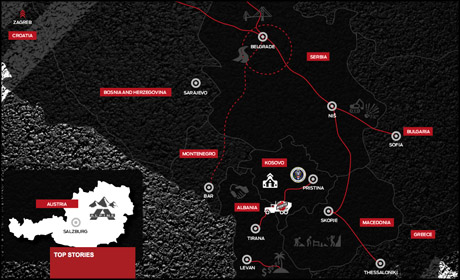
The Balkan Investigative Reporting Network (BIRN) today published an interactive site which aims to expose corruption in road construction in the area.
Road to Ruin is a cross-borders reporting project, produced in collaboration with Austrian magazine DATUM, and presented primarily as an interactive map.
"It's just a different way of trying to tell the story, of trying to explain to people how all the roads are linked up and hopefully making what could be quite a dry subject a bit more exciting," said BIRN journalist and editor Lawrence Marzouk.
Roads are plotted out on the map with key points highlighted that readers can click through to read related stories as they are published.
One of the stories from the investigation, looking at the involvement of a US ambassador with a highway deal in Kosovo, was published by the Guardian earlier this year.
And the team's latest piece, investigating the collapse of Austrian construction company Alpine Bau, was jointly published on Road to Ruin and in DATUM today.

Screenshot from Road to Ruin
BIRN is also collaborating with an expert in the field to put together a guide to investigating corruption in road building, highlighting elements journalists should look for every step of the way.
The series, called Road Corruption Unmasked, will be expanded to include more interactive features.
Road to Ruin is part of a wider initiative to promote investigative journalism in the region, and BIRN has also published a series of investigations into energy deals in the area.
Power Games also uses interactives to "cut through the jargon" and explain how the complex sector works.
"The website helps us fast track people's learning process so that they can actually go in and go through our interactive functions, and start to understand how energy's sold, how it's transmitted from country to country, how it's produced," said Marzouk.
The initiative, funded by Austrian Development Cooperation, brings together teams of journalists, "not necessarily established investigative journalists", to identify issues that affect countries in the region.
The journalists are given training in investigative and data journalism, as well as insights from experts in the particular field they are covering.
"Because they're sometimes quite complex, quite technical subjects, it's useful to have the background knowledge that you don't necessarily gain if you're constantly chasing stories day in, day out," explained Marzouk.
In the case of Road to Ruin, for example, journalists from Albania, Macedonia, Serbia and Austria have been interviewing more than a hundred sources in the past year.
But how do BIRN journalists collaborate across borders and share sensitive documents?
Marzouk said the team hold weekly meetings on Skype, and they have been using Google Drive to store and share files.
BIRN has also built a custom "virtual library and office space" called BIRN Source, he added.
The platform is used to collect documents in a searchable database, fitted with an optical character recognition scanner that works on all alphabets and languages used in the area.
"The idea is to create a decent-sized library of important documents for the region, so that people are able to start spotting links across borders that they haven't seen," he said.
Free daily newsletter
If you like our news and feature articles, you can sign up to receive our free daily (Mon-Fri) email newsletter (mobile friendly).
Related articles
- New investigative project helps resource-poor newsrooms report on health
- New global network investigates obstacles to climate action
- Investigating human trafficking, with ICIJ lead reporter Katie McQue
- What journalists can do to prevent and fight SLAPPs
- How to take your first steps into investigative journalism









